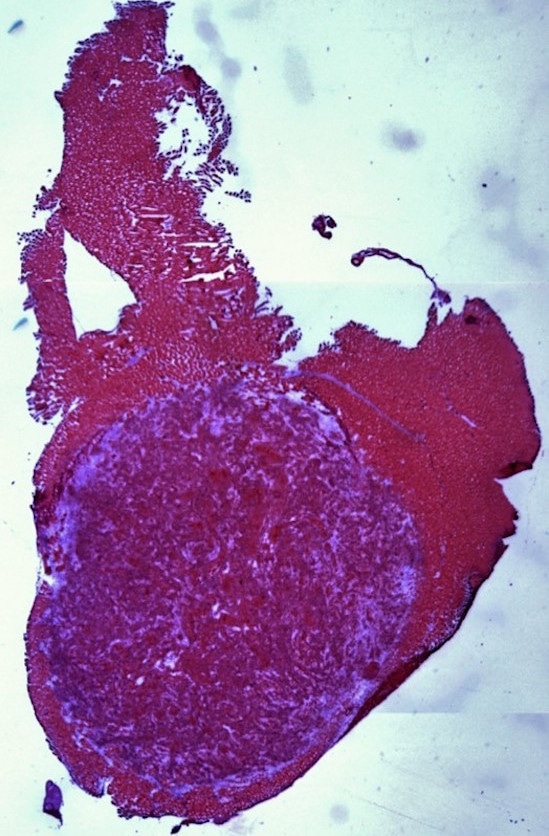Jan 25 2018
Next month, scientists at UT Southwestern Simmons Cancer Center will start testing a digital nanosensor that illuminates cancer tissue, to see whether it can enhance the accuracy of cancer surgeries, thus minimizing cancer recurrence and surgical morbidity.
 Slide showing cancer surrounded by healthy tissue (Image credit: UT Southwestern Medical Center)
Slide showing cancer surrounded by healthy tissue (Image credit: UT Southwestern Medical Center)
The nanosensor, which functions by reacting to low pH, illuminates cancer like a light bulb; sharply differentiating cancerous tissue from healthy tissue and making it easier for surgeons to take out cancer cells while leaving healthy, functional tissue unharmed.
“We synthesized an imaging probe that stays dark in normal tissues but switches on in solid tumors, behaving like a digital sensor with binary readouts between the two states,” said Dr. Jinming Gao, Professor of Pharmacology and Otolaryngology with the Harold C. Simmons Comprehensive Cancer Center at UT Southwestern Medical Center, which is recognizing its 75th anniversary in 2018. “Cancer is a diverse set of diseases, but it does have some universal features. As solid tumors ramp up, they eat more glucose and secrete lactic acid, so the microenvironment around the cancer cells is acidic.”
Dr. Gao and surgeon Dr. Baran Sumer, Associate Professor of Otolaryngology with the Simmons Cancer Center, built the sensor and have combined it with a clinical camera that allows the surgeon to view the fluorescent areas. Their nanosensor not only lights up cancer, but subdues the signal in normal tissue, leading to a sharp line between cancer and healthy tissue. It is estimated to be effective in all solid tumors.
This new digital nanosensor-guided surgery has several advantages for patients, including more accurate removal of tumors and greater preservation of normal tissue. These advantages can limit the extent of surgery and improve quality of life and, potentially, patient survival.
Dr. Sumer, Simmons Cancer Center
Breast cancer patients will be the first to be treated with the new technology at the University of Groningen in the Netherlands, which is partnering in the clinical trials. Patients will be intravenously injected with the nanosensor medication roughly 12 hours before surgery. Tumors will illuminate and remain fluorescent for one to two days. Dr. Sumer and Dr. Gao anticipate getting data on breast cancer and colon cancer surgeries by fall, then hope to proceed on to Phase II clinical trials in the U.S. and elsewhere.
What we have is a digital probe that might eventually lead to more exact surgeries so that solid-cancer surgeries would not need to be followed up with radiation or chemotherapy.
Dr. Sumer, Simmons Cancer Cente
The nanosensor technology and the camera used to view the fluorescent cells are being designed by OncoNano Medicine, Inc., which was the recipient of a Cancer Prevention and Research Institute of Texas product development award to create this technology. Dr. Gao and Dr. Sumer are paid consultants and scientific co-founders of OncoNano Medicine, Inc. UT Southwestern Medical Center has licensed the technology to OncoNano Medicine and has a financial interest in the research.
The Harold C. Simmons Comprehensive Cancer Center is the only NCI-designated Comprehensive Cancer Center in North Texas and one of just 49 NCI-designated Comprehensive Cancer Centers in the nation. Simmons Cancer Center is among just 30 U.S. cancer research centers to be designated by the NCI as a National Clinical Trials Network Lead Academic Participating Site.